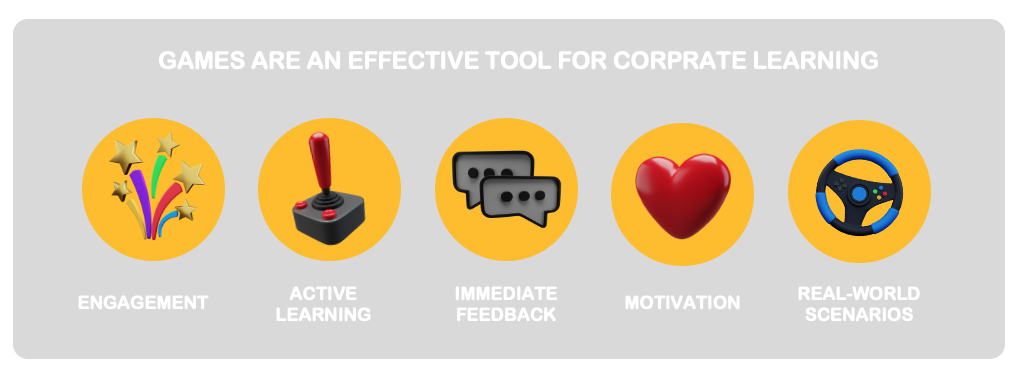
WHY RETAIL STAFF NEED TO
UNDERSTAND THE CUSTOMER JOURNEY
How games engage, motivate and enhance learning outcomes
Games have been used as a tool for learning for centuries, and with the advancements in technology, game-based learning has become even more popular and effective. They have this powerful effect in learning because games provide an engaging and interactive experience that can capture learners' attention and interest. The active nature of games requires learners to proactively participate and make decisions, rather than passively receiving information. Because we are so passionate about this subject, we will have a closer look at some additional benefits and explain why games are such an effective tool for corporate learning. And after: why does it matter?
ADVANTAGES OF GAMES
To start with, what makes games such a powerful tool in learning, to acquire and practice new knowledge and skills? There are, in my opinion, a couple of important reasons.
- First of all engagement: games are inherently engaging and can captivate players for hours on end. This high level of engagement can make it easier for players to retain information and stay focused on the task at hand.
- Secondly, games often require players to actively solve problems and make decisions, rather than passively receiving information. This active learning approach can be more effective in helping players understand and retain information.
- Games also provide immediate feedback on players' actions, allowing them to quickly adjust their strategies and improve their performance.
- Also, games often include rewards and progress tracking, which can help motivate players to continue learning and improving.
- And last but not least, games can simulate real-world scenarios that are difficult or impossible to replicate in a traditional classroom setting. Training games allow players to practice and apply their skills in a safe and controlled environment.

EFFECTIVE TRAINING GAMES
Alright, but what makes a training game great for corporate learning? First of all there's no one-size-fits-all when it comes to corporate training games, the effectiveness of a game-based learning experience may vary depending on the context, audience and specific learning objectives. But there are some some key elements of effective training games worth mentioning, such as:
- Engaging and interactive gameplay that keeps learners motivated and interested.
- Well-defined and measurable learning objectives that align with educational standards.
- Clear and immediate feedback that allows learners to assess their progress and make adjustments to their learning strategies.
- Opportunities for learners to apply and practice new knowledge and skills.
- The game should be accessible and inclusive to all learners.
- The game should be designed with clear didactics in mind, meaning that it should be based on sound educational principles and research.
OKAY, SO HOW DOES THAT HELP?
Then there’s the important question ‘Why does it matter?’. From our own experience - and the results of research from third parties - we know that it’s a challenge to get and keep Millennials and Gen-Z’s ‘engaged’ at work. They are digital natives who are used to getting instant feedback and are more likely to engage in activities that provide immediate results. Game-based learning provides instant feedback, which can help to keep them motivated and engaged in the learning process. They are also highly visual and are more likely to engage with multimedia content. And they value learning that is relevant and applicable to their lives. Training games often simulate real-world scenarios, making the learning experience more relevant and applicable to their lives.